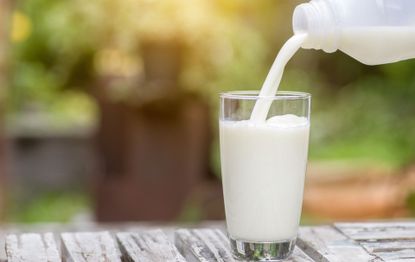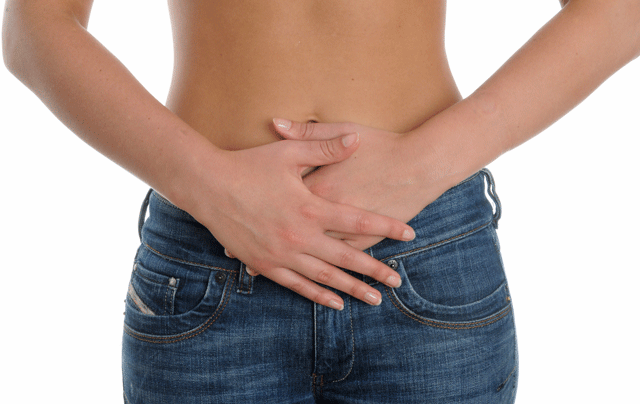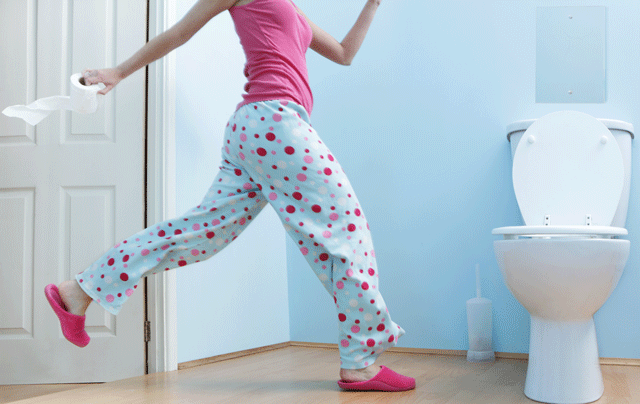Why is my stomach bloated? Causes and 10 ways to reduce bloating
Sick of that swollen, uncomfortable bloated belly feeling? Read all about the common causes for a bloated stomach and how to tackle them.


Why is my stomach bloated and how can I get rid of trapped wind, you may ask. Here are some of the reasons why you may be suffering and how to ease your discomfort.
'Bloating is a common issue for many women and can be caused by a number of factors,' says Claire Snowdon-Darling, a hormones expert, head of The College of Functional Wellness and founder of kinesiology clinic Balanced Wellness. 'And women suffer from bloating more because high levels of oestrogen will cause water retention. Women also experience more IBS symptoms due to hormonal imbalances, and one of the symptoms of IBS is bloating,' she explains.
'Abdominal bloating can have different reasons behind it. It's characterised by a feeling of gassiness or feeling distended,' explains The Gut Stuff team, aka Lisa and Alana Macfarlane, co-authors of The Gut Stuff: An empowering guide to your gut and microbes (£13.94, Pavilion Books).
You're not alone in thinking 'Why is my stomach bloated?' or wondering how to improve gut health, either. 'It's one of the most common gut symptoms, and one of the things we get asked about the most,' says The Gut Stuff team. 'In fact, it's become a popular Instagram trend that people tend to associate with how bloating LOOKS, but a lot of people are still confused as to what it actually is and if they should worry about it.'
'Our gut is a finely tuned machine designed to move in co-ordination to move food and gas forward in a seamless fashion,' continues Mr Abhay Chopada, consultant gastrointestinal surgeon at Gastrosurgery UK. 'When this balance is disturbed – either due to excessive gas in the intestine or uncoordinated bowel movement (subconsciously happening 24/7) – people can perceive a sense of bloating,' he explains.
Why is my stomach bloated? Causes of bloating
'There's no single culprit to bloating, and we are all individual. It depends on many things like stress, gut microbes, how sensitive your gut is and how quickly you eat your food,' says The Gut Stuff team.
'Certainly, there's a current trend of demonising bloating, but there are so many reasons why we get bloated. These range from not chewing properly to your microbes having a little party after lots of fibre,' continues The Gut Stuff team. 'Above all, it's important to remember that the severity of bloating will vary from “feeling a wee bit gassy” to experiencing pain and discomfort.'
GoodtoKnow Newsletter
Parenting advice, hot topics, best buys and family finance tips delivered straight to your inbox.

Proven ways to reduce bloating
Here are some of the most common reasons as to why you are bloated and what you can do about it.
1. Stop wearing tight clothing while eating
'It's sometimes not about WHAT you eat but HOW you eat. This may seem a little far-fetched but tight clothing can constrict your stomach, making it more difficult for things to pass through,' explains The Gut Stuff team. Therefore, loosen your clothes before eating.
'It's the same with the position in which you're sitting when you have your meal – check your eating position,' says the team.
2. Have better eating habits
You're more likely to suffer from bloating if you have developed 'poor eating habits like not chewing properly or eating too fast,' says Claire. 'We have to be super mindful of this – try resting your cutlery between mouthfuls and chewing food until its semi-liquid,' advises The Gut Stuff team.
'Try to balance your blood sugars at every meal by making sure you eat protein and fats with your carbs,' adds Claire.' You might also consider taking a digestive aid. A magnesium supplement (such as VOOST Magnesium Effervescent Tablets, £15.58 for 60, Amazon) can also help, especially if you’re constipated,' she says.
'Walking for a few minutes after meals helps a lot of people,' recommends Dr Chophada.
3. Eat the right amount of fibre
Sometimes a low fibre diet is prescribed to people who suffer with bloating because of bowel problems.
'Foods like lentils, beans, broccoli, asparagus, corn, wheat, potatoes, artificial sweeteners or too much fibre can cause bloating,' says Mr Chophada. 'Keeping a food diary to see if any specific foods trigger your symptoms and trying an elimination diet can help.'
'Your gut bugs have a bit of a party when you feed them fibre, which can shake things up while your gut adjusts. So you might find yourself a little bloated or windy,' adds The Gut Stuff team. 'Try to increase your fibre intake by 5g per day per week over a few weeks to reduce the risk of bloating,' advises the team.
If you love bread, here are some breads that may not make you bloat.
4. Check for a food intolerance or allergy
'Occasionally, a wheat allergy or lactose intolerance results in a lot of undigested food that can be acted on by bacteria and cause bloating,' says Dr Chopada.
'If you want to reduce bloating consider food intolerances,' says Claire. The most common intolerances are lactose (found in dairy and some processed foods), fructose (found in fruit, fruit juice, fruit sugars, honey and some vegetables), wheat and gluten, and eggs. 'You can do this by cutting out food you think you might be intolerant to and seeing how your body reacts. If you aren’t sure, find a specialist who can test you,' she advises.
'Over the counter medications like Deflatine tablets (£5.99 for 30, Boots) can help,' adds Dr Chophada.

5. Ditch fizzy drinks
Perhaps unsurprisingly, soda is another culprit. 'Excessive fizzy drinks may cause bloating,' says Mr Chophada. This is because they release the gas carbon dioxide into the stomach.
Instead, switch soda and other fizzy drinks such as beer and sparkling water for still water. There are numerous benefits to drinking water and reducing bloating is one of them. 'Hydrate! It helps food move through the digestive system and aids constipation,' advises The Gut Stuff team.
6. Try to stress less
'Several things can contribute to bloating, such as when you swallow a lot of air subconsciously when you're stressed,' says Dr Chopada. This is because when we are anxious our breathing may become irregular, we may gulp more air, or we inadvertently hold our breath.
'The gut-brain connection is a strong one,' says The Gut Stuff team. 'The gut-brain axis describes a back-and-forth communication pathway between the central nervous system and the gastrointestinal tract, which uses signalling hormones and all sorts of other fancy messengers to manage what we do and how we feel on a daily basis. Stress may increase the risk of bloating because of changes in the physical function of your gut and how it affects your microbes,' explains the team.
'Learn how to manage stress. It doesn’t have to be yoga and gong baths. Importantly, do what works for you. This could be a chat with a pal or a walk in nature,' advises the The Gut Suff team.
'I recommend trying to reduce stress by exercising everyday (learn how to start running, for example) and switching off those devices at night!' says Claire. Another way way to calm down during times of stress is to learn a few breathing exercises for anxiety.
7. Stop smoking, chewing gum or wearing dentures
According to the charity Guts UK! "chewing gum, smoking or wearing loose dentures all promote air swallowing" and can cause bloating. Avoid using gum and quit smoking. Visit the NHS Stop Smoking Service, or call the Smokefree National Helpline on 0300 123 1044 for help. If your dentures are loose see a dentist.
8. Check for certain medical conditions
'Medical conditions which affect co-ordinated bowel movements including bowel inflammation, irritable bowel syndrome (IBS) or even conditions like diabetes can result in bloating,' says Mr Chophada.
'Underlying digestive issues such as Small Intestine Bacterial Overgrowth (research shows that SIBO is seen more often in IBS sufferers), IBS or an unresolved gut infection, plus blood sugar imbalances that mean we make too much stress hormone can result in bloating,' says Claire.
According to one study "probiotics may be helpful in the treatment of irritable bowel syndrome, enteritis, bacterial infections, and various gastrointestinal disorders and diarrhoea." The same study found that "probiotic microorganisms are also effective in the alleviation of lactose intolerance." Taking probiotics can actually cause bloating at first, until your gut microbiota settle down, though they are worth persisting with. While pricey, the food supplement drink Symprove (£79 for a month's supply, Amazon) – which contains live bacteria – has been found to be very effective at improving gut health in some people. Users have found that it reduces bloating and some symptoms of IBS. It has also been attributed to a better mood.
You can also reduce bloating by eating certain foods. For example, many IBS sufferers have also had success with the Fodmap diet.
9. Balance your hormones
'Hormone imbalances, and hormone shifts like childbirth or menopause, are a common cause of bloating,' says Claire. If you are going through the menopause, this menopause diet may help.
'You can help to balance your hormones by reducing exposure to toxic chemicals. A lot of toiletries have chemicals in them that mimic oestrogen (xenooestrogens) and these can contribute to the issue. Consider going clean with your skin care!' says Claire.
Over time, aim to replace cosmetics, skincare and cleaning products with paraben-free versions.

10. Stop holding it in
Sometimes, a distended stomach is simply a sign that you need to go to the loo. 'Try not to hold in going to the toilet – if you gotta go, GO!' says The Gut Stuff team. Likewise, if you are constipated 'exercise can help with getting things moving and therefore reduce gas build-up.'
When to see a doctor
If you find yourself wondering 'Why is my stomach bloated?' a lot, or you notice any of the following, you should seek medical help:
- Blood in your stools
- Unexplained weight loss
- Abdominal pain
- Persistent diarrhoea
- Unexplained fever
- Loss of appetite
- Vomiting.
'I recommend you get checked for chronic bloating,' says Claire. 'Most importantly, if it's partnered with a fever or accompanied by unusual vaginal bleeding.' While it's unlikely, the symptoms we have mentioned – combined with bloating – may indicate a more serious problem such as bowel or ovarian cancer.

Debra Waters is an experienced online editor and parenting writer. She also has a strong background on health, wellbeing, beauty, and food. She currently writes for Goodto and Woman&Home, and print publications Woman, Woman’s Own, and Woman’s Weekly. Debra has written for What to Expect, Everyday Health, and Time Out. In addition, she has had articles published in The Telegraph and The Big Issue.
-
 Worried about your teen 'being smelly'? They can't help it, according to scientists, and help is on its way to ease the problem
Worried about your teen 'being smelly'? They can't help it, according to scientists, and help is on its way to ease the problemWe know that puberty can cause all sorts of smells to emanate from teens - now scientists have revealed exactly what you're smelling, and how evolution contributed.
By Lucy Wigley Published
-
 Parenting coach shares 4 'powerful' reframes to try next time it feels like your kid is pushing all your buttons (and #4 is a game changer)
Parenting coach shares 4 'powerful' reframes to try next time it feels like your kid is pushing all your buttons (and #4 is a game changer)A parenting coach has shared four ways parents can reframe their thoughts when their kid has big emotions. Giving them a try could offer big results in little time.
By Lucy Wigley Published